What is Rectocele?
The pelvic organs are supported by various muscles and ligaments. Over time, these tissues stretch as a result of childbirth, excessive straining or age causing the pelvic organs to shift from their normal location. Rectocele is form of Vaginal Prolapse when the tissues between the rectum and vaginal wall become damaged or weak, allowing the wall of the rectum to prolapse or bulge into the vagina. Although this situation is more common among women who have had multiple pregnancies with vaginal deliveries, it can also develop in women over time who have had challenges with chronic constipation, excessive weight, performed regular heavy lifting or have a chronic cough.
These images provide a visualization of the progression of Rectocele both with a uterus and without (post-hysterectomy).
RECTOCELE PROGRESSION WITH UTERUS
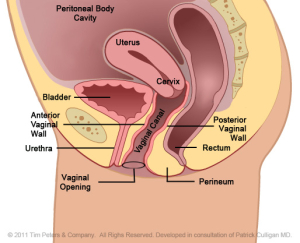
Pelvic cavity before Rectocele.
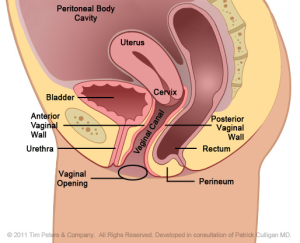
Shift of the cervix starting a weakening of the posterior vaginal wall.
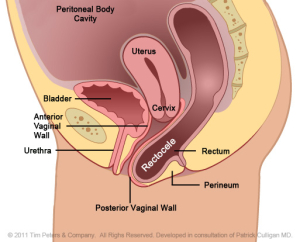
An advancement of the weakening of the posterior wall resulting in a Rectocele.
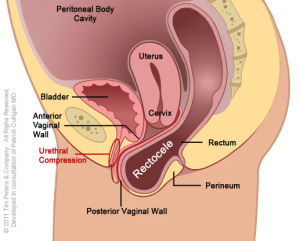
Advanced Rectocele showing urethral compression, closure of the vaginal canal and a bulge in the rectum.
Original Images Courtesy of BARD Medical – Subject to Copyrights. Labeling Enhanced for Educational Purposes by D. K. Veronikis, MD
RECTOCELE PROGRESSION WITHOUT UTERUS
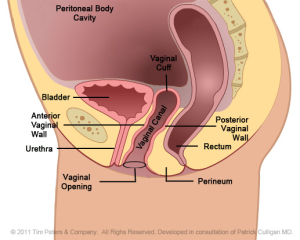
Rectocele progression without a uterus.
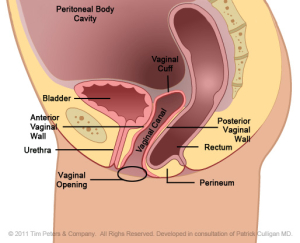
The early stages of Rectocele shoing stretching of the rectum.
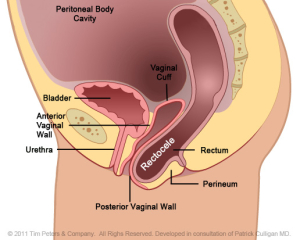
Rectocele now advancing with greater compression of the perineum.
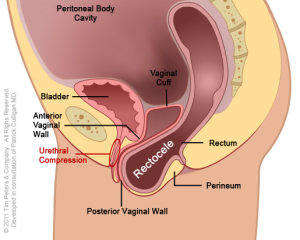
Advanced Rectocele showing urethral compression, closure of the vaginal canal and a bulge in the rectum.
Original Images Courtesy of BARD Medical – Subject to Copyrights. Labeling Enhanced for Educational Purposes by D. K. Veronikis, MD
The image on the far left reflects the normal position of the posterior vaginal wall and of the rectum. Moving from left to right, the image on the far right shows an advanced case of posterior vaginal wall prolapse. Additionally, the advanced prolapse of the posterior vaginal wall can stretch the normal location of the rectum causing challenges with fecal elimination. With advancing prolapse (as indicated on the far right) the rectum will protrude the vaginal opening and will be perceived as a bulge. Singular pelvic floor defects are a rare occurrence. For the benefit of explanation we will consider Rectocele an isolation. A Rectocele is a defect of the support of the posterior vaginal wall and is a type of Vaginal Prolapse.
Symptoms of Rectocele
Mild cases of Rectocele may not experience specific symptoms. However, in more severe cases you’re likely to notice vaginal discomfort or pain during intercourse. You may also notice a pulling or tugging sensation in your pelvis area or a feeling of pressure or pain. This pressure may also rest on other organs like the bladder causing symptoms of stress incontinence. The most prominent symptom for most patients is a soft bulge of tissue in the vagina.
Treatment for Rectocele
Treatment for Rectocele really depends on the severity of the condition. More mild cases benefit from Kegel exercise that strengthens the pelvic muscle tissues. Additional nonsurgical options includes inserting Pessary supports into the vagina. For situations where the rectocele bulges outside the vagina, surgery is recommended. This will typically include a reconstructive process that not only repairs the tissue damage in the rectum and vagina, but the surgeon will also repair damage made to surrounding organs or tissue. These procedures can be performed using minimally invasive surgery techniques which reduces the recovery time experienced by a patient.
